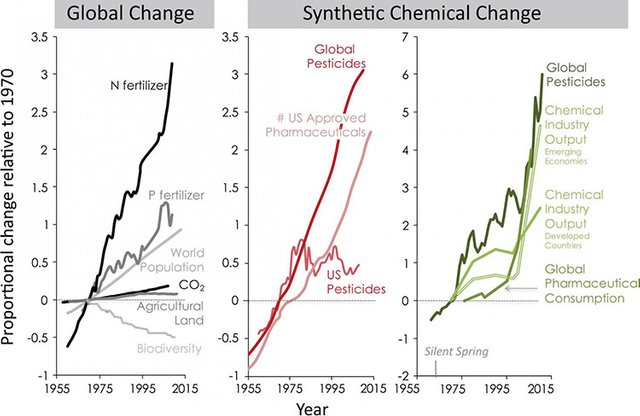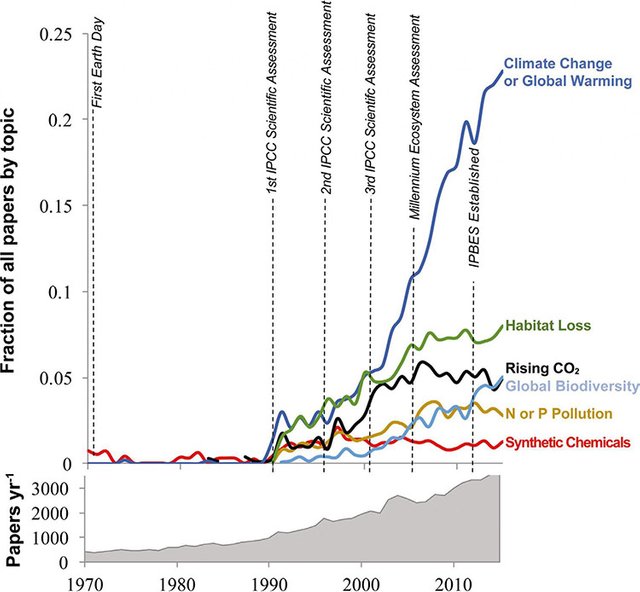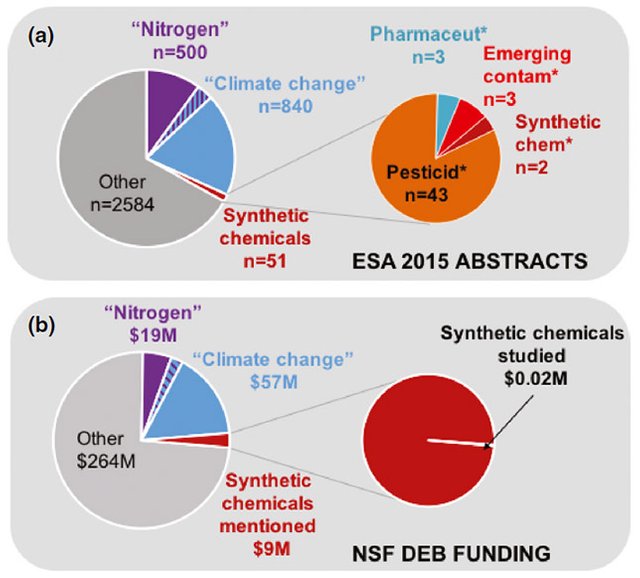Many people and scientists around the world are focusing on carbon dioxide as the most responsible factor for global change, specifically global climate change. Yet, the steady rise in manufacturing and release of synthetic chemicals into our environment is not being properly analyzed.
The ecological effects of pharmaceuticals, pesticides and industrial chemicals is severely lacking in research, according to a new study in Frontiers in Ecology and the Environment.

source
According to the co-author Emma J. Rosi, ecologist from the Cary Institute, global change assessments are ignoring synthetic chemical pollution despite the increasing rate of use is more rapid than other agents of global change, like CO2 emissions or nutrient pollution.
For something to be considered an agent of global change, it needs to meet the criteria set out by the Millennium Ecosystem Assessment. It needs to be 1) globally distributed, 2) have an increase in relation to human populations and economic growth, and 3) also have known impacts on biological diversity and organisms. Despite synthetic chemicals matching this criteria, the overall scientific community has been ignoring a proper assessment of their impact.
The study looked at synthetic chemical pollution since the 1970s and compared the results to other factors that drive global change. Out of all the leading ecological journals, ecological meetings and presentations, and Natural Science Foundation grants for research, less than 1% of journal articles, 1.3% of presentations and 0.01% of grants have been used to explore the ecological effect of these chemicals.

Total publications and the proportion of published papers
Look at that chart above, there is a crazy difference in the amount of papers about Climate Change compared to synthetic chemicals.
Another researcher and author, Emily S. Bernhardt, confirms this sad state of affairs:
"Research on the ecological impacts of synthetic chemical pollution has been static since the 1970s. But our portfolio of these manufactured chemicals keeps growing - with more than 80,000 now in use commercially. This knowledge gap is becoming a chasm, with real consequences for ecological health."
Synthetic products, such as pesticides, pharmaceuticals and industrial chemicals do leave long-term toxic effects that ripple through different layers of our ecosystem. Lab research does not equate to what happens in nature. There is a bioaccumulation indifferent food webs. As various chemicals seep through different layers of our environment they also mix with other chemicals to form reactions are even more toxic. The chemicals can also be affected by sunlight or even processes of natural chemical releases from organisms in nature.
"At present there is grossly insufficient information to assess the environmental impact of the wide variety of synthetic chemicals in use today, particularly when it comes to effects at a large scale and in the long run."
I have talked about this in my work on psychology, the importance of knowing the consequences to our actions before we foolishly engage in them (not that we can always avoid it). Humanity has been engaging in the same foolish behavior, where we arrogantly create things and start using them without understanding the consequences and deleterious effects that such creations can potentially bring. We seem to create whatever we want to get the result we desire, and then ignore a proper evaluation of what this will do in the long term. Humanity has long been focused on short-term gains. We are not properly evaluating our behavior as individuals, nor our behavior in the aggregate as a species.
The primary funding agency for ecological research in the United States is the National Science Foundation, and they are not supporting ecological research into synthetic chemicals. Neither are other US governmental agencies and private foundations that used to fund long-term research, due to having their budgets cut or redirecting their funding to human health and lab-based studies that don't evaluate the reality of the chemical interactions in the complexity of nature. Studying things isolated in the lab will only get you so far.

source
The paper suggests the following to deal with this problem:
- increasing funding to accelerate synthetic chemical impact research
- foster collaboration between ecologists and ecotoxicologists to predict and reduce environmental harm
- launching an international effort to assess chemical pollution impacting the targets of Intergovernmental Panel on Climate Change (IPCC), the Intergovernmental Panel on Biodiversity and Ecosystem Services (IPBES), and the Sustainable Development Goals (SDGs)
"Synthetic chemicals are leading agents of global change and it's essential that we invest in the research needed to understand and minimize their impacts."
The problem of synthetic chemicals and their dangers on the environment and our own health, has been an issue that has been brought up since the 1960s, yet it hasn't been taken seriously enough. The "global warming" meme started in the 80's, leading up to where we are now, while ignoring other factors that play a part in climate change. "Global warming" was dropped in the latter part of the first decade of this millennium, and substituted with climate change, but the CO2 focus and blame squarely on humans hasn't changed.
Personally, I have posted comments remarking on the dangers of chemicals, and other things that humans have not properly evaluated the consequences to these new modifications, such as genetically modified organisms. Yet when I, or other people, mention the obviousness of the dangers of chemicals and how we are poisoning ourselves, some people want to make fallacious remarks about how chemicals are in everything, therefore in their minds, there's nothing wrong with synthetic chemicals made by humans.
There is this hyper-skepticism that seems to pervade society and prevent people from recognizing the obviousness of problems in reality that we are creating. Ignorance is bliss for some.
References:
If you appreciate and value the content, please consider:
Upvoting  , Sharing
, Sharing  or Reblogging
or Reblogging  below.
below.
@krnel
2017-01-25, 12pm

@KrNel, your post has been chosen by @STEEMNEWS.ONLINE as one of today's promoted posts for its excellent content. We've upvoted, resteemed and published it through Facebook & Twitter.
As the author of a SNO featured article, you've been awarded one TRAIL coin. Please stop by the SteemTrail Discord server to learn more about how to claim your TRAIL coin. You will need an Open Ledger account to do so.
STEEMNEWS.ONLINE is the @SteemTrail for #news and watches the #steemnews tag most closely. Please consider supporting excellent news articles by making steemnews.online one of your operators on Streemian, in addition to steemtrail.
Thank you for your hard work and contribution of excellent content to Steemit.

If you would rather not be promoted by STEEMNEWS.ONLINE, please inform us by replying to this comment and we will honor your request.
Downvoting a post can decrease pending rewards and make it less visible. Common reasons:
Submit
Thanks :)
Downvoting a post can decrease pending rewards and make it less visible. Common reasons:
Submit
Great article. Well done in trying to clear up some facts, following for the well reasoned view.
Downvoting a post can decrease pending rewards and make it less visible. Common reasons:
Submit
Nice piece. The reason for this is because scientific research facilities and universities only receive government grants if they can produce results that suggest climate change is real and that humans are responsible for it.
When faced with losing potentially millions of dollars in funding, it is unsurprising that so many scientists then pull pseudo-scientific data out their arses.
There are plenty real scientists out there who are calling out this fallacy for what it is, but they are ostracized by their peers and discredited so as to be silenced.
Why this is happening is a much better question. My best guess would be to justify the soon to be implemented Global carbon tax as well as the potential depopulation agenda.
Downvoting a post can decrease pending rewards and make it less visible. Common reasons:
Submit
Indeed. It's easier to point to one thing, CO2, and then one thing allegedly mostly responsible for it: humans. Hehe. Thanks for the feedback.
Downvoting a post can decrease pending rewards and make it less visible. Common reasons:
Submit
'Oh no! Temperatures might be rising. Quick, set up a massive taxation system for all human activity and make it payable to Goldman Sachs. That way, within 50 years, we'll be paying them for the right to breathe.'
Downvoting a post can decrease pending rewards and make it less visible. Common reasons:
Submit
The problem in short is this: Their continued funding is dependent upon certain results.
Downvoting a post can decrease pending rewards and make it less visible. Common reasons:
Submit
I agree. That is a chronic problem in many frontiers of science. It is a publish or die environment, and which journals want to publish negative results?
In Ben Goldacre's book Bad Science, he looks at the example of a published study that showed undergraduate students could predict the future. Someone attempted to replicate the research and failed, however no journal would accept the results for publication. Now there is an article floating around that suggests undergraduates can predict the future, yet the contradicting evidence is not available.
Downvoting a post can decrease pending rewards and make it less visible. Common reasons:
Submit
Nope, no it isn't. Its just dependent on a result, experimental design testing what it is designed to test, and that the data is defendable against reviewer scrutiny. I am not sure why so many share your line of thinking, but speaking as someone who knows how the funding works its not that way.
Downvoting a post can decrease pending rewards and make it less visible. Common reasons:
Submit
Your position is emic. Perhaps you can't see the wood for the trees.
Downvoting a post can decrease pending rewards and make it less visible. Common reasons:
Submit
Doubtful. Scientists by an large aren't this monolith of corruption that you and others seem to think.
This is not to say that there aren't people who do what you said, but they are more the exception then the norm.
Downvoting a post can decrease pending rewards and make it less visible. Common reasons:
Submit
I don't think that either. But I do understand geopolitics and the forces attempting to drive the west. And I also understand human nature and how highly educated people can often have their head in the sand over various subjects. Scientists are never taught how powerful the ego is in entrenching a position.
The delusion being 'This climate model I've written using lovely grant money adequately replaces the 'experimentation' part of the scientific method.
Downvoting a post can decrease pending rewards and make it less visible. Common reasons:
Submit
Good science is a business risk...best not to do it. Crazy!!
Downvoting a post can decrease pending rewards and make it less visible. Common reasons:
Submit
It's actually completely the other way around, but noone is required to know this before they start doing business.
Instead we tell everyone exactly what you just wrote and then the largest out of the companies run to the government for protection against the smaller competitors who would thrive on creating a solution to the problems caused be the former two institutions.
Downvoting a post can decrease pending rewards and make it less visible. Common reasons:
Submit
When you put it like that...i see what you mean. Its the fault of monopoly once again and they exist because people are so easy to corrupt....especially those who want to lead and thrive off the pretense that they are there to serve. Got to end the printing presses and take the governance into blockchain consensus...
Downvoting a post can decrease pending rewards and make it less visible. Common reasons:
Submit
Exactly. I think that's the next step. The only lasting monopoly is that of a state limiting the knowledge of regular consumers. We have to go at it the other way around, we have to create systems that make state limitation on knowledge impossible.
The same goes for other issues. Instead of reaching out to state government - our benevolent oppressor in the name of protecting us from radical ideas - we need to create systems of government that can stand on their own in a market enviroment.
That is what I call Cooperative Agorism. The systematic, gradual and thoughtful, replacement of the state in its entirety, with all of its current benevolent functions, by means of creating something that the majority can instantly recognize as better.
-The blockchain community is one of the best examples of this process taking place. Starting with outbuilding - rather than breaking up or simply trying to launder - one of the most important aspects of a traditional nation state, the monopoly on money, and then gradually working itself into other sectors.
As a Cooperative Agorist, I don't talk about "government" as the problem. I don't like cults of course, but in terms of politics I'm concerned specifically with eliminating all forms of conscription i.e. slavery, borders, taxation, all forms of "protection" or anything else the individual did not consent to; Any form of involountary government. But not "self-government", "order" or "rules". Not protection that the members of a cooperative may themselves have agreed to etc.
Downvoting a post can decrease pending rewards and make it less visible. Common reasons:
Submit
I really really love the way you think. I guess i could be a 'co-operative agorist' then :)
Downvoting a post can decrease pending rewards and make it less visible. Common reasons:
Submit
Edit: Yes, actually I might have been a little confused at first because of what I thought was a different joke. =) You could be entirely right; If you're an agorist in the sense that Konkin defined it and you then cooperate with me.
Otherwise, if you agree that the above method no matter if it happens in white, grey or black markets is the best way to bring about positive change at all times (this is not to suggest it's pacifism, as it doesn't mean you can't resist an enemy and it doesn't even mean you can't also vote in elections is you want to), then you are no longer strictly speaking an Agorist (whos primary method is trying to establish/establish themselves in black markets, rather than creating and aiding cooperative networks or such enabling technologies in whichever of the markets makes most sense for the time being), but rather a a Cooperative Agorist.
Either way, I'm happy to discuss and work with you. Our first project together, being the Steem community. =)
Downvoting a post can decrease pending rewards and make it less visible. Common reasons:
Submit
Realmmente creo que si es posible
Downvoting a post can decrease pending rewards and make it less visible. Common reasons:
Submit